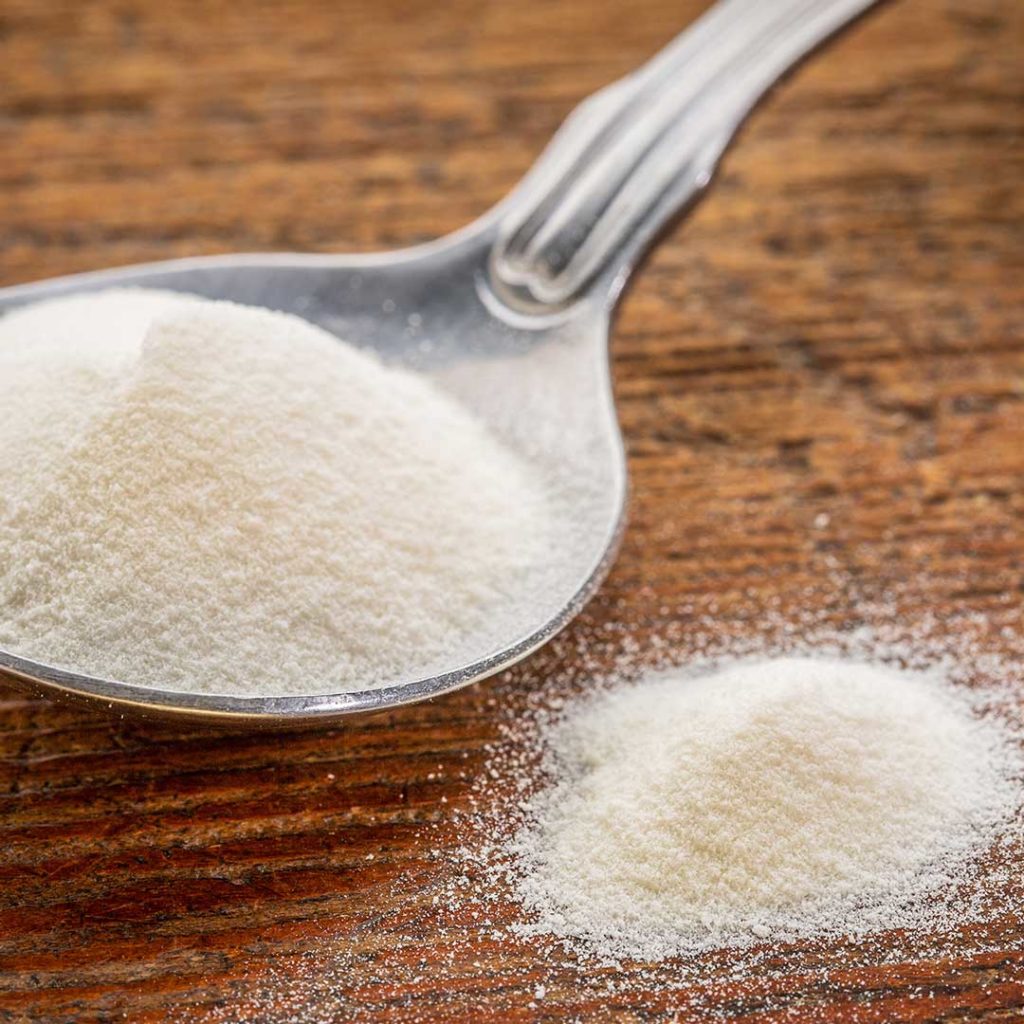You may have heard a friend talking about collagen, seen it on your Instagram feed, or read about all the impressive ways it can impact your health in your favorite magazine. First off, what is collagen? Secondly, does it live up to the hype?
What is Collagen?
Collagen is the most abundant protein in the body, making up 25-35% of the whole body’s protein. It is an essential component of our connective tissues, cartilage, bone and skin. Collagen contains 18 of 20 amino acids that help perform key functions in our bodies. It helps to protect and provide strength to our body’s structures. The body produces collagen on its own, but with age the ability to produce collagen decreases, which is why it is important to consume enough through diet.
Collagen comes from the Greek word ‘Kolla’, which means glue, and collagen is like glue that helps hold the body together. If cartilage, tendons, ligaments, skin and bones of animals are boiled down it turns into gelatin. Gelatin is the cooked form of collagen. Another cooked form of collagen, is collagen peptides. It differs from gelatin in that it doesn’t become a gel when it is cooled. That is because they are processed so that the proteins are broken down into smaller pieces that maintain the amino acids, but prevent it from turning into a gel when added to liquid. It is an easily digested form of collagen, and contains all of the health benefits that gelatin does.
Collagen has raved for its ability to improve skin, gut health, joint health, and much more. There is research to support some of these claims; however, the studies done on collagen are limited as it is a newer area of study. While it may not be a cure-all supplement, there are definitely some benefits to taking collagen.

Benefits of Collagen:
Collagen can help maintain joint health:
- Cartilage is found throughout your body, and the cartilage in your joints protects your bones from rubbing against each other.
- Collagen helps provide your body what it needs to build and maintain the cartilage in your joints to maintain joint health.
- Collagen can also help to increase bone and mineral density to maintain bone health.
Collagen can help maintain a healthy gut:
- Collagen contains the amino acids glutamine and glycine, which are essential for healthy digestion.
- Glutamine aids in healing and growth of new cells and tissues that make up your GI tract.
- Glycine contributes to the production of bile salts and gastric acid secretion in the stomach to aid in digestion.
- Glutamine and glycine are also important for liver health, which aids in the natural detoxification of your body.
Collagen can help maintain healthy skin:
- Collagen is an essential building block for your skin, providing structure and elasticity.
- As we age, collagen production decreases, which causes wrinkles and thinning of the skin.
- Collagen can help to improve skin hydration, elasticity, and structure, which improves overall appearance of skin. It also supports the growth of hair and nails.
Collagen can help strengthen the immune system:
- Glutamine is also an important amino acid for several immune functions.
- Your body produces glutamine on its own, but its ability to do so is decreased when it is under physical and emotional stress, which can lead to illness.
- Glutamine is involved in cellular turnover and repair of immune cells, which helps to speed healing after an injury, infection, burn, or illness.
- Supplementing with collagen, especially when sick or injured, can help provide glutamine needed for a healthy immune system that your body may not be producing properly.

Takeaway:
Collagen can help to maintain healthy skin, gut health, joint health, and immune health. It should be incorporated it into a healthy lifestyle that includes both exercise and balanced nutrition, and not used as something to make up for poor nutritional and exercise habits. If you are interested in adding a collagen supplement, a collagen peptide supplement is one of the easiest ways to add it into your current routine. They can be added to any liquid, dissolve easily, and can be unflavored or flavored based on preference.


